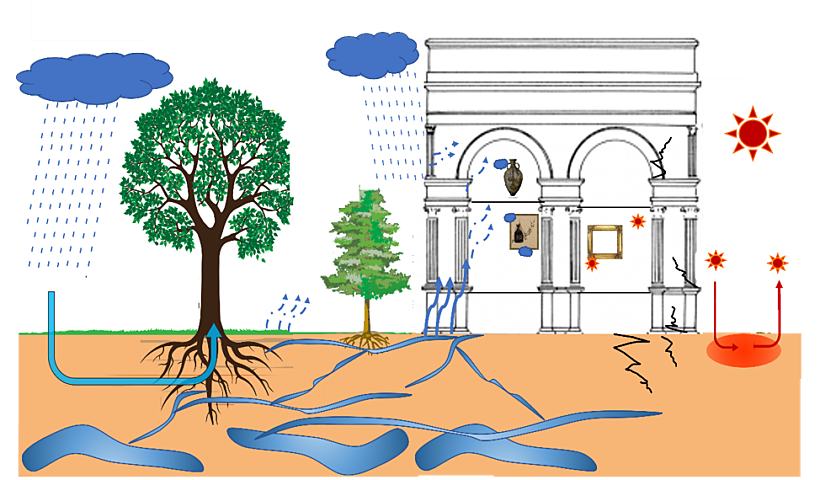In short
Climate change is a risk for all, including for heritage. By understanding how climate factors affect heritage, we can find better ways to protect it. In particular, the REFRESH project, coordinated by KIK-IRPA, studies the impact of water on historic heritage sites.
REFRESH brings together research teams from Belgium, France, Italy and the UK and focuses on four emblematic sites: the Doge's Palace in Venice, the Louvre in Paris, the Gruuthuse Museum in Bruges and Blenheim Palace in Woodstock. The project analyses the water cycle on three levels: the nature around the buildings, the outer shell of the buildings, and the interior with the heritage objects preserved inside.
Heritage buildings hosting collections
Cultural heritage, as represented by collections in museums and the built environment, is an indispensable social, cultural and economic resource. Due to climate change, extreme phenomena such as droughts, floods, severe storms and heat waves are occurring more frequently across Europe. While the impact of climate change on society and ecosystems has garnered significant attention, the consequences for cultural heritage have largely been overlooked. However, climate change may lead to the partial or even total loss of these valuable cultural treasures.
One of the main factors determining the impact of climate change on heritage buildings and their collections, especially if they are surrounded by natural environments such as parks and gardens, is the amount of water (both abundant and deficient) and its transfer.
In this context, the REFRESH project aims to understand the role of the water cycle on the conservation of cultural heritage sites with a holistic approach that considers water dynamics at three levels:
- The liquid water in the natural environment (soil and vegetation in gardens and parks)
- The liquid to vapor water transfer within the architectural building envelope (monument)
- The vapor to liquid water in interiors and collections (condensation phenomena)

The nature-culture relationship
REFRESH aims to identify levers at the heritage site scale to optimise conservation of cultural heritage while improving water management and reducing energy consumption. To achieve the project objective, a transdisciplinary approach will combine historical, experimental, theoretical and numerical studies of water transfers across three scales at real heritage sites with respect to climate data.
There are several essential steps:
- Study the history of hydraulic systems at the heritage sites to gain insight into previous measures.
- Analyse the water levels in the soils of the natural environment, in the building envelope and in the museum collections.
- Characterise the materials at the site at every scale and identify their degradation. These analyses will be used to create a database of materials for each heritage site.
These simultaneously obtained results will be used to study the hygrothermal behaviour of materials in the natural environment, building materials and materials of the objects in the collections. This will enable us to understand the different water transfers in the external environment, from the external environment to the building envelope and from the building envelope to the internal environment. Finally, we will conduct a survey among museum visitors to raise awareness and find levers for sustainable solutions. With the adaptation measures identified in this project, we will identify how the relationship between nature and culture can strengthen the resilience of cultural heritage by mitigating the effects of climate change.
What is a JPI project?
The REFRESH project coordinated by KIK-IRPA is a JPI project in association with JPI Climate. The Joint Programming Initiative on Cultural Heritage and Global Change (JPI CH) was created in 2010 on the basis of an instrument launched by the European Commission. It is a Member State-led initiative that brings together national research funding bodies, ministries and research councils across Europe to address societal challenges within the framework of the European Research Area (ERA).
JPI Climate is a collaborative network of 14 European countries that jointly coordinates their climate research and funds new transnational research initiatives. The JPI Climate connects scientific disciplines, enables cross-border research and increases interaction between science and practice.



















